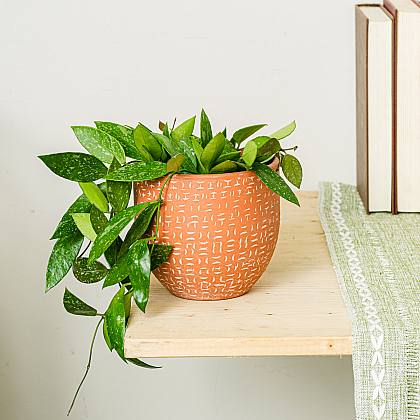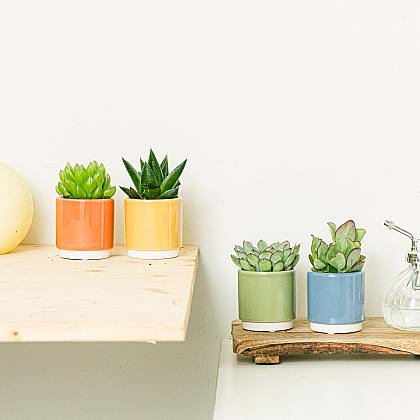Harmonious coexistence of plants and pets: our best tips
Harmonious coexistence of plants and pets: our best tips. In this article, we will look at how plants and pets can live together harmoniously. We'll discuss why...
Harmonious coexistence of plants and pets: our best tips. In this article, we will look at how plants and pets can live together harmoniously. We'll discuss why plants and pets go well together, which houseplants are especially suitable if you have pets, and give you tips on how to care for houseplants when pets are in the house. Also, we will discuss the danger of poisonous plants for pets and show you how to avoid damage to houseplants by pets. Finally, we'll also take a look at how to make the garden pet-friendly if you have pets. Read on to find out our best tips for a harmonious coexistence of plants and pets.
Why Plants and Pets Go Together
Not only are plants and pets beautiful additions to our homes, but they also go great together. Pets such as dogs and cats can benefit from houseplants, as they can improve air quality and regulate indoor climate. Plants absorb pollutants from the air and release oxygen, which is especially beneficial for pets that spend a lot of time indoors. However, there are some types of plants that can be toxic to pets, so it's important to choose carefully and pay attention to safety. A harmonious coexistence of plants and pets also requires a certain amount of care and attention. For example, houseplants should be placed out of the reach of curious pets to avoid damage to the plants or injuries to the animals. In the garden, it is important to remove poisonous plant species and grow animal-friendly plants instead. A great way to create a safe environment for pets is also to use natural fertilizers and pesticides in the garden. In conclusion, plants and pets can be a perfect match if you pay attention to the needs of both and take some simple precautions.
The Best Houseplants for Pet Owners
Pet owners who also love houseplants should take extra care when choosing their green roommates. Some plants can be toxic to pets and cause health problems. However, there are many houseplants that are safe and allow pets and plants to coexist harmoniously.
For example, some of the best houseplants for pet owners include the green lily, which is not only easy to care for but also absorbs air pollutants. The sword fern and money plant are also non-toxic and hardy enough to remain unharmed by curious pets. Another option is cacti and succulents, which not only look decorative, but also require hardly any care.
For cat owners, cat grass or catnip are also suitable as houseplants. These plants are not only non-toxic, but also promote the well-being of the animals. Dogs, on the other hand, can benefit from aloe vera, which not only has a healing effect, but can also help with digestive problems.
In general, however, before you buy a new houseplant, you should find out about its compatibility with your own pet. Even if a plant is considered non-toxic, it can still cause allergic reactions. It is therefore advisable to pay attention to appropriate instructions when buying houseplants or, if in doubt, to consult a veterinarian.
Tips for caring for houseplants with pets in the house
If you have houseplants in a household with pets, there are some important tips to keep in mind to ensure the harmonious coexistence of plants and animals. First of all, it is advisable to ban poisonous plant species from your home. There are a variety of houseplants that are safe for pets, such as the green lily, the money tree or the bow hemp. Not only are these plants non-toxic to your animals, but they are also relatively easy to care for.
Another important tip is to place the plants out of reach of your pets. Cats are often very curious and may tend to nibble on the leaves or dig up the soil. Make sure your plants are in a place that your animals can't reach.
In addition, you should be careful when watering. Some pets have a special interest in water and might try drinking from the saucer or reaching the water from the flower vase. Be careful not to water your plants excessively and make sure there are no harmful chemicals such as fertilizer in the water.
Finally, it's important to regularly dust the leaves of your houseplants. Not only can this help keep your plants healthy, but it can also prevent pets from licking the leaves and potentially harming them.
By following these tips and creating a safe environment for your pets, you can ensure the harmonious coexistence of plants and animals in your home.
Pets and Poisonous Plants: What to Consider
Pets and Poisonous Plants: What to Consider
If you have pets and want to keep houseplants in your home, it's important to be aware of which plants can be potentially toxic to your furry friends. Some plant species contain toxins that can cause gastrointestinal discomfort, skin irritation, or even serious poisoning in pets. Therefore, it is advisable to keep poisonous plant species out of the house or at least place them out of reach of your pets.
Some of the most common poisonous houseplants include the popular dieffenbachia, ivy, rubber tree, and aloe vera. It is important that you educate yourself about the specific toxins and symptoms that these plants can cause. This way, in case of poisoning, you can act quickly and take your pet to the veterinarian.
Another precaution is to make sure your pets can't nibble on the plants or knock them over. Place the plants on raised shelves or use flower pots with sturdy stands to prevent damage. Additionally, you can also offer your pets alternative chews and toys to take their interest away from the plants.
If you're unsure which plants are safe for your pets, you can contact your local veterinarian or experts at gardening and pet supply stores. These professionals can give you recommendations and help you create a safe environment for your pets.
By educating yourself about poisonous plants and taking appropriate precautions, you can ensure a harmonious coexistence of plants and pets, while protecting the health of your beloved animals.
Pets and Indoor Plants: How to Prevent Damage
Pets and houseplants can have a harmonious relationship, but there are some things to keep in mind to avoid damage. First, you should make sure that your plants are non-toxic to your pets. There are many houseplants that are safe for animals, such as bromeliads or green lilies. However, there are also some poisonous plants, such as the Dieffenbachia or the rubber tree, that should be avoided. If you are unsure which plants are poisonous, you can find a list on the Internet or contact a gardener.
Another important factor is the placement of your plants. You should make sure that your pets are not able to get to your plants. For example, you should choose hanging plants or use shelves to keep your plants out of reach of animals. Another option is to create a barrier around your plants by placing a small fence or cover around the pot.
Finally, make sure your pets don't dig into the soil of your plants or use it as a toilet. A simple solution to this is to place pebbles or small stones at the bottom of the pot. This also prevents the soil from drying out and promotes better drainage.
Overall, it's important to be careful when caring for houseplants with pets in the house and make sure they create a safe environment for both. By choosing non-toxic plants, placing them appropriately, and using pebbles, you can avoid damage to your plants and pets, as well as promote harmonious coexistence.
Cohabitation of pets and garden plants: what to consider
Cohabiting pets and garden plants can be challenging, as some plants can be toxic to animals. It's important to know which plants are safe for your pets and which should be avoided. Some of the safest garden plants for pets include grasses such as rye, wheat, and barley, as well as herbs such as mint, basil, and rosemary. If you want to grow vegetables, carrots, zucchini, and cucumbers are safe for pets. However, avoid tomatoes, peppers, and eggplant, as they can be toxic to dogs and cats.
When it comes to flowers, there are many safe options such as sunflowers, roses, and daisies. However, avoid lily of the valley, oleander, and azaleas, as they can be toxic to pets. If you are unsure whether a particular plant is poisonous or not, you should remove it or seek advice from a veterinarian or gardener.
Another thing to keep in mind is digging pets in the garden. If you have a garden, you'll want to make sure it's pet-friendly and that your pets don't have access to poisonous plants. You should also make sure that your pets do not dig holes that could be potentially dangerous.
Overall, it's possible for pets and garden plants to coexist harmoniously, as long as you're aware of which plants are safe and which should be avoided. By ensuring that the garden is pet-friendly and that pets do not have access to poisonous plants, one can create a safe and happy coexistence.
How to make the garden pet-friendly
A pet-friendly garden can be a haven for different types of animals and help promote natural diversity. Here are some practical tips on how to make your garden pet-friendly. First, it is important to grow a variety of plants that provide food and shelter for animals. Choose native plants that meet the needs of native animal species. Plants with flowers and berries are especially attractive to birds and insects. Secondly, you should avoid the use of pesticides, as they are not only harmful to insects, but also to other animals that might eat them. Instead, use natural pest control methods, such as spreading beneficial insects or planting insect-repellent herbs. Thirdly, it is important to provide water sources in the garden. This can be in the form of a pond, a bird bath, or simply a shallow bowl of water. Animals need water for drinking and bathing. Finally, you should also create shelters for animals, such as piles of leaves, cairns, or nesting boxes. These provide protection from predators and help the animals to feel comfortable in the garden. By designing an animal-friendly garden, you can make a valuable contribution to the harmonious coexistence of plants and animals.
When it comes to the harmonious coexistence of plants and pets, there are many aspects to consider. We have given you the best tips on how to choose and care for houseplants if you have pets. We've also pointed out which poisonous plants to avoid and how to prevent damage to your houseplants. But what about the garden? How do you make it animal-friendly? This is another important issue that should not be neglected. Pet-friendly garden design can be an asset to your pet while promoting wildlife diversity. From choosing plants that attract insects to creating retreats for birds and small mammals, there are many ways to make your garden attractive to animals. Think about how you can make your garden more animal-friendly and what measures you can take to make the coexistence of plants and pets even more harmonious. It is our responsibility to create an environment where both plants and pets can thrive. So let's look for solutions together and make our gardens a place where people, animals and nature can live in harmony with each other


